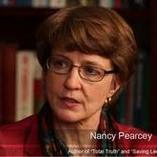
Is there a natural way to live?
Are we happier if we follow it? Nancy Pearcey, author of Love Thy Body: Answering Hard Questions about Life and Sexuality, defends that view in this excerpt :
Every ethic stems ultimately from a view of nature—because our bodies are part of nature. The liberal secular
Here’s how a recent New Yorker article put it, “the loyalty oath of modernity”–isn’t that a grand phrase—the loyalty oath you must take if you want to be considered a modern person—is that “nature is without conscious design … the emergence of Homo sapiens was without meaning or telos” (the Greek word for goal or purpose).
The implication is that the human body has no intrinsic purpose that we are morally obligated to respect—and the mind is free to use it any way it wants.
That’s exactly how homosexuality is defended by the outspoken lesbian and public intellectual Camille Paglia.

Camille Paglia rejects the idea that sexuality is a social construction. No, she writes, nature made us male and female—humans are a sexually reproducing species. But then she asks, and these are her words: Why not “defy” nature? After all, “Fate, not God, has given us this flesh. We have absolute claim to our bodies and may do with them as we see fit.”
The logic is that if our bodies are products of mindless, purposeless forces, then they convey no moral message, they give no clue to our identity, “We may do with them as we see fit.”
By
In Love Thy Body I tell the story of a woman named Jean who lived as a lesbian for several
Jean said: I finally came to trust that God made me female for a reason, and I wanted to “honor my body by living in accord with the Creator’s design.”
In fact, in Love Thy Body I tell lots of personal stories, and one of my favorites is the story of Sean. As a young man, he identified as gay and was exclusively attracted to other men. Today he is married to a woman and has three children. What changed? What’s interesting is that Sean grew up in a “gay affirming” family and attended a “gay affirming” church, so his change was not driven by any sense of guilt or shame. Instead, Sean says, I stopped defining my identity by my sexual feelings “and started regarding my physical body as who I was.” His goal was not to try to change his feelings, which rarely works. “Rather, it was to acknowledge what I already had (a male body) as a good gift from God.” And eventually “my feelings started to follow suit.” Instead of defying nature, to use Paglia’s words, he accepted his embodied existence as fundamentally good. That’s really the question at the core of this debate: Do we live in a cosmos operating by blind, material causes?
Or a cosmos created by a loving Creator which is therefore intrinsically good?
See also: Nancy Pearcey At More Than Cake, On How Darwin Really Triumphed